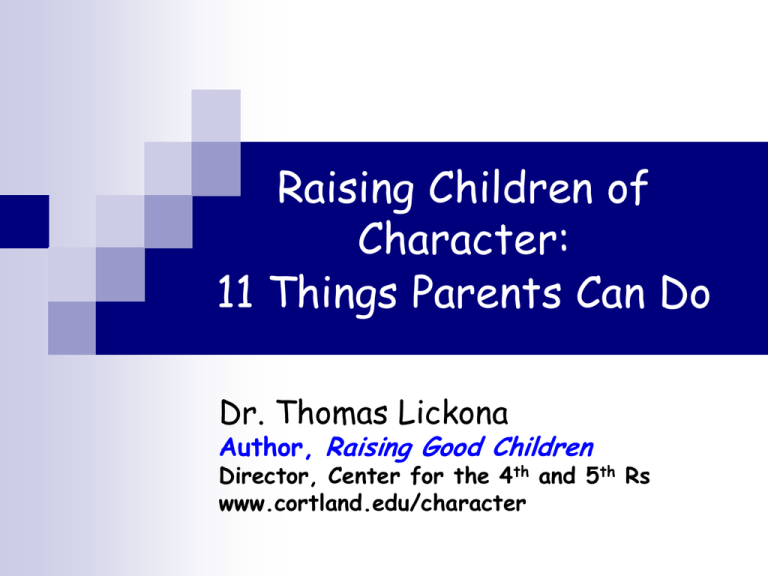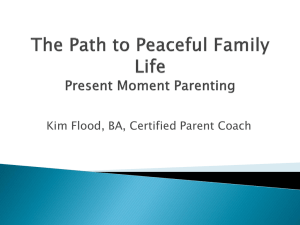
Raising Children of
Character:
11 Things Parents Can Do
Dr. Thomas Lickona
Author, Raising Good Children
Director, Center for the 4th and 5th Rs
www.cortland.edu/character
The Home-School Partnership
The
family is the first school of
virtue.
Schools and families must work
together to develop good
character.
Anti-Bullying Efforts
“Prevent Bullying, Promote Kindness: 20
Things All Schools Can Do,” pp. 1-3
“How Can Parents Prevent Bullying?” by
Michele Borba, p. 7
2011 issue of excellence & ethics,
www.cortland.edu/character
Parent Support Groups
Meet every 6-8 weeks in someone’s
home.
4 couples with students at the same
developmental level.
Parents choose the topic for the evening.
Parents share success stories and
challenges around the focus issue.
Grilled Cheese Sandwich Story
We don´t have to be
perfect parents.
A wise bishop:
“Our
children don’t need to see
a perfect role model, only
someone who is trying.”
Parenting Does Not Create the Child
Parents can put their children on
the right path, but the final
forming of a person’s character
lies in their own hands.
—Anne Frank
11 Principles
Principle 1
Know what good
character is and make
character development
a high priority.
What is the content of
good character?
10 Essential Virtues
Wisdom (Good Judgment)
2. Justice (Golden Rule)
3. Fortitude (Inner Toughness)
4. Self-control
5. Love (Sacrifice for Others)
6. Positive attitude
7. Hard work
8. Integrity (Honesty w/Yourself)
9. Gratitude
10. Humility (Desire to Be Better)
1.
performance character (needed for best work);
moral character (needed for best relationships)
Make character
development a high priority
and take the long view.
Research finds that adults who were
overindulged as children have
difficulty coping with life’s
disappointments.
They have a distorted sense of
entitlement that gets in the way of
success in the workplace and in
relationships.
Principle 2:
Build a happy
marriage—based on
love, respect, and
commitment.
If you are a single parent . . .
Find
at least one other parent and
share parenting experiences.
Be emotionally supportive of your kids.
Be firm but not harsh in your discipline.
Know where your kids are and what
they are doing.
Marital Ritual: Daily Talk Time
Plan a regular time for 15 minutes of oneon-one conversation with your spouse.
Don’t use it to discuss conflicts or make
difficult decisions.
Focus on connecting emotionally with
each other—share your feelings about the
day.
—Dr. William Doherty, The Intentional Family
A “Date” Every Other Week
Essential ingredients:
Just the two of you
Something you both enjoy
Time for meaningful conversation (but not
about problems)
Tip: Take turns proposing the time and
activity.
Work on communication—
understanding each other’s
needs and feelings.
Take turns “being understood.”
(Use active listening.)
Have Reconciliation Rituals
Healthy families have rituals that enable
them to forgive and make up quickly after
an argument.
“Please forgive me.”
“A hug for health”
“Let’s pretend that blow-up didn’t
happen—and wipe the slate clean.”
Work Together as Parents
1.
2.
Share the responsibilities of
parenting.
Support each other. If you
disagree about how to handle a
situation with a child, do so
privately—not in front of the child.
Principle 3
Love children
(affirmation, time,
communication, & sacrifice)
Attention and Affirmation
Notice and nurture your children’s
interests—an authentic way of loving
and respecting them.
A sport, talent, or other interest helps
a young person develop their sense
of being their own person.
MOLLY’S STORY
A15-year-old girl in therapy because of
rebellion against her parents’ values
To avoid this kind of rebellion,
help kids develop their own
interests and their own identity as
a person.
Praise more than you criticize
“My father criticized me constantly. He
wanted me to be tough. I guess he
thought that by pointing out my faults,
I would get better. It made me stop
trying.”
An Affirmation Ritual:
The Christmas Letter
“Each Christmas my husband and I wrote a
letter to each of our 5 kids and put it under
the tree.
“We told them what we loved and
appreciated about them, the ways we had
seen them grow during the past year, the
talents and character strengths we saw
emerging….”
TIME
We
need psychologically intimate,
face-to-face time with our children.
Attending
their sports games and
other events does not meet this need.
A son remembers . . .
“When I had a cold, my father would rub my chest
with Vicks and cover it with a red flannel cloth.
On Sunday afternoons, we would walk together
to the top of the hill by the dam.
“Once there, we would sit on a rock and look down
on the town below us. Then I would tell my
problems to my father, and he would speak of
his to me.”
—Christian Barnard, originator of the heart
transplant
A Saturday Ritual
“I have four kids. Each of them
gets one Saturday afternoon a
month where it’s just the two of us
doing something we both enjoy.”
—a School Superintendent
Communication:
Back-and-forth Questions
1.
2.
3.
4.
5.
How was today on a scale of 1 to 10—where
1 is “terrible” and 10 “terrific”? Why?
What happened today that you didn’t
expect?
What did you accomplish today that you feel
good about?
What did you learn today?
What’s an interesting conversation you had?
The Family Meal:
Have a “Topic.”
1.
2.
3.
4.
5.
What was the best part of your day?
What did you learn today?
How did you help someone today?
What is something you’re grateful for?
What’s a problem you’re having that the
rest of the family might be able to help
with?
Sacrifice
“The most important thing parents can do for
their children is to love each other and
stay together.”
—a mother
“Being a responsible parent means putting
yourself second for a quarter of a century.”
—Albert Ellis
Principle 4
Be an
authoritative
parent.
Parents must have a
strong sense of
moral authority
—their right to be
respected and obeyed.
3 styles of parenting
(research of Diana Baumrind):
Authoritarian
Permissive
Authoritative.
Authoritative parenting combines:
1.
2.
3.
4.
5.
Love
Confident authority & rule enforcement
Reasoning
Listening to child’s feelings if
expressed respectfully (parents make
final decision)
Encouragement of age-appropriate selfreliance
At all developmental
levels, the most
confident and
responsible children
have authoritative
parents.
Ways to Say No
1.
2.
3.
4.
5.
6.
No.
No, and that’s final.
No, and don’t ask me again.
I have thought about it, and the
answer is no.
I know you know how to nag. It
won’t work.
Nice try, the answer is still no.
Have a zero tolerance
policy for
disrespectful speech
and behavior.
Require
children always to speak
respectfully to you—in what they
say and in their tone of voice.
Set a consequence in advance:
“What is a fair consequence
for speaking to me
disrespectfully?”
Insist on respect, courtesy, and
kindness in all family interactions.
Don’t tolerate disrespect or
disobedience to you, or rudeness
(“Shut up!”), name-calling
(“Stupid!”), or other unkindness
toward siblings.
Principle 5
Teach by
example.
Moral Moments Our Children
Remember
The stands we
take define
our values.
Other Positive Role Models
The Giraffe Hero Project, www.giraffe.org
www.teachwithmovies.com (hundreds of
films categorized by values)
Books That Build Character by William
Kilpatrick (Touchstone, 1994)
Principle 6
Manage the
Moral
Environment
The importance of supervision:
The most academically motivated and
morally responsible teens—the least likely
to engage in risky behaviors:
1.
Have warm and involved relationships with
their parents
2.
Have parents who set clear expectations and
monitor their children’s activities in ageappropriate ways.
-Building a Better Teenager,
Child Trends 2002 research report, www.childtrends.org
Media Facts
The average child sees about 100
commercials a day.
The average young person consumes nearly
7 hours of electronic media a day.
Three-quarters of 6th-graders have their
own TV in their bedrooms.
—Kids and Media at the New Millennium ,
www.kff.org
What The Research Shows
1.
2.
3.
Kids who watch the most violent TV
are the most violent.
Kids are also desensitized by exposure
to violence.
Teens who frequently watch sexual
content are more likely to become
sexually active.
Set Limits on Use of Media
1.
2.
3.
4.
5.
Have “quiet nights” (TV is off).
Make watching TV a special family
event, not a private pastime.
Set limits on time on Internet, video
games, telephone . . .
“A parent’s permission is required for any
use of TV, Internet, or other media.
“We don’t allow media that goes against
our family values.”
Explain your rules and expectations:
“I don’t want you going to R-rated
movies with a lot of sex and violence
because I care about you.
“I don’t want you putting junk into your
mind, just as I don’t want you to put
junk into your body.”
RECOMMENDATION:
Consider having
NO TV
while you have children
in the home.
Supervise Social Media
“For
your own sake, I’ll check your
online activity (posts, texts, emails)
periodically.
“Please let your friends know I’ll be
doing this.”
Your Child’s Friends
“What is a true friend? A false
friend?”
Share stories from your life.
Principle 7
Use direct teaching to
develop conscience
and moral reasoning.
Judith Martin (columnist):
“Raising a civilized child takes
20 years of constant
teaching and another 10 of
review.”
Forming conscience in 2-year-olds
You hurt Amy!
Pulling hair hurts.
NEVER pull hair.
Teach Empathy
“There are two kinds of
hurts: outside hurts that you
can see, and inside hurts
that you can´t see, like a
hurt feeling.”
A daughter remembers . . .
When I was 15, I adopted the ungracious
habit of referring to certain classmates as
“losers.”
My father took me aside and pointed out that
it wasn’t right to dismiss anyone like that,
as if they weren’t persons, as if they didn’t
have a soul.
That habit ended that day.
Dad’s Two Sets Of Threes
On honesty:
Never lie.
Never cheat.
Never steal.
On adversity:
Don’t whine.
Don’t complain.
Don’t make excuses.
-John Wooden
Ask-Don’t-Tell
Use questions to get kids thinking:
What’s the rule about this?
What will happen if you keep arguing?
How can you solve this problem?
How can you help make this a good day
instead of a bad one?
Why am I upset with you?
Why is it wrong to cheat?
It violates trust.
It’s unfair to those who aren’t
cheating.
It’s a form of lying.
It will lower your self-respect.
Why not drink?
“You’re laying the foundation for your future
during these years. You don’t need drinking
when you’re learning to drive. You don’t
need drinking when you’re learning to relate
to the opposite sex.
“Save drinking for later, when you’re mature
enough to handle it, and it will be legal for
you to drink.”
Teach a Vision about Sex
“Sex is so special, it deserves a special
home. It is most meaningful when it’s part
of something bigger. When you are
married, your sexual intimacy expresses
your total commitment to each other.
“The ultimate intimacy belongs within the
ultimate commitment.”
“10 Emotional Dangers of
Premature Sex”
www.cortland.edu/character
(Character-Based
Sex Education Tab)
The attempted suicide rate for 12- to16-year-old girls who have had
sexual intercourse is six times
higher than for peers
who are virgins.
D. Orr, M. Beiter, & G. Ingersoll, “Premature sexual
activity as an indicator of psychosocial risk,”
Pediatrics, 87, 141-147.
The Rewards of Waiting
1.
2.
3.
4.
Waiting will increase your self-respect.
Waiting will teach you to respect others.
Waiting means a clear conscience (no
guilt,no regrets).
By waiting you are developing the
character that will attract a person of
character.
Real Love Character Test
Is this person kind to me?
Does this person ever bully me?
Does this person always expect to get his
or her own way?
Can I trust this person?
Does this person ever pressure me to go
against my values?
Stages of Moral
Reasoning
Principle 8
Discipline Wisely
Have consistent rules
Help with clean-up after meals.
Answer the phone politely. (“This is Max
Lickona. Who would you like to speak to?”)
Don’t call me from another room (“MOM!”);
come to where I am.
Don’t leave your clothes lying around the
house; hang them up.
Say, “May I please have . . .” not, “I want ...”
When kids do something
wrong, require them to . . .
1.
2.
3.
Say, “I’m sorry.”
Say why they are sorry.
Ask, “What can I do to make
up for it?” (restitution)
“What do you think is a fair
consequence for what you did?”
Principle 9
Provide opportunities for
kids to practice the
virtues.
Character development is
not a spectator sport.
Virtues are habits that
develop through
practice.
Children develop character by
what they see, what they
hear, and what they are
repeatedly led to do.
—James Stenson
HARVARD STUDY
John and Beatrice Whiting studied 6
cultures: the U.S. and 5 “developing
nations.”
Findings:
U.S. kids had the fewest responsibilities in
family life.
U.S. kids were the most self-centered.
The New Yorker, July 2, 2012:
“Spoiled Rotten”
TEACHING RESPONSIBILITY
Chores are a way to contribute to
the family.
Don’t pay kids for chores.
SERVICE BEYOND
THE FAMILY
A father of 7 asked his
kids:
“What goal are you
working on this month?”
Principle 10:
Solve problems
and conflicts
fairly and with
love.
Hold Family Meetings
1.
2.
3.
4.
5.
Set/review rules: Respectful talk, no put-downs.
“What something you appreciate that someone
in the family did for you recently?”
“How can we make this a happy week? What
is a problem we need to solve?”
Go around, giving everyone a chance to speak.
Leader writes down and then reads back what
each person said.
Combine ideas into an agreed-up plan; all sign
and post agreement.
FAMILY COMPACT
To help everyone feel loved & respected:
Parents will:
Parents will not:
Children will:
Children will not:
DINNER COMPACT
To have happy dinners:
Parents will:
Parents will not:
Children will:
Children will not:
Family Meeting to Assess Progress
Set a weekly time.
How are we doing?
Give everyone a turn
First celebrate success: “I think we did better
on . . . .”
Then discuss areas for improvement: “I think
we can still do better on . . . .”
The Fairness Meeting
1.
2.
3.
Achieve mutual
understanding.
Find a solution everyone
thinks is fair.
Have a follow-up meeting
to discuss how it’s working.
Fairness Agreement
1. If Mom has promised to do something with us,
she will tell the person she is busy and will call
back later.
2. Will make a list of things to do while mom is
on the phone.
3. Mom will try to make her calls shorter.
4. If mom has to be on the phone for a longer
time she will tell us, and we will behave.
Mom, Phillip (7) and Ben (5)
Principle 11
Foster spiritual
development.
Religion’s role in character
Teens who regularly practice their religious
faith are:
More involved in service activities
Less likely to steal, be violent, or use
drugs and alcohol
Less likely to have sex.
-www.childtrends.org
Why do many young people fall
away from their faith when they
leave home?
A high school boy:
“I never used to pray. Now I believe
that, basically, you need God.
“When you pray, your problem might
not get fixed when you want, or in the
way you want—but you get help.”
If you have faith,
TALK ABOUT GOD.
A young mother of four says:
“Dad always closes his letters with, ‘Work
hard and pray a lot.’ This never sounds
phony because it’s what he does. He has
worked hard all his life, and he prays
throughout the day.
“My most powerful image of my father is
seeing him late at night, kneeling by his
bed, saying his personal prayers.”
For more resources on developing
character in the family or school:
Center for the 4th and 5th Rs
www.cortland.edu/character










